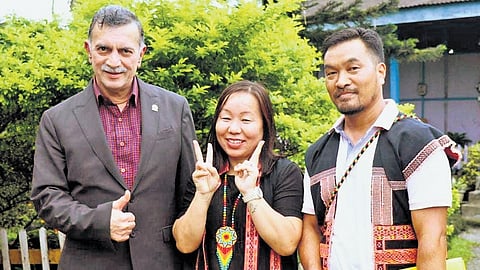

ARUNACHAL PRADESH: Desai Linggi, a 47-year-old woman from Roing in Arunachal Pradesh, has become a beacon of hope for abandoned and destitute children. Over the years, she has dedicated her life to caring for them, earning recognition from government agencies, public sector undertakings, NGOs and the local community.
From tending kids as a nursemaid, she now runs five institutions, a hostel, a school, a children’s home, a one-stop centre and an adoption agency, under the banner of the Nani Maria Society. Linggi’s empathy for abandoned children stems from her own difficult past.
Born into a broken family, she never experienced a stable home. Her parents separated three months before her birth, and by the time she was six, her father took her away, leading to a custody dispute. “I was given a choice to stay with either my mother or father. I chose my father, knowing my mother’s financial struggles,” she recalls.
But life with her father was not easy either. He remarried twice and she grew up in an emotionally fragmented household.
She pursued her education in two convent schools in Assam before returning to Roing. However, loneliness and instability affected her studies, and she failed twice in her Class 10 board exams. By then, her father had shut down his business due to financial losses, and she started working as a nursemaid at Divine Word School in Roing.
Seeing a lack of hostel facilities for toddlers, she decided to open one herself. “I love children, and that’s when I thought of starting a hostel,” she says. In 2000, she rented a piece of land and, with help from well-wishers, built Nani Maria Hostel using bamboo and other materials. It began with 25 children, and over the years, the numbers grew.
“I still remember a couple looking for a hostel. When they inquired, I confidently told them I was starting one. I didn’t have a building yet, so I showed them someone else’s house,” she admits. “When they asked about the fee, I randomly quoted Rs 5,000 per year. They immediately paid. That child is now a law graduate.”
Her hostel became more than just a shelter, it became her home. “I come from a broken family with two stepmothers, three stepbrothers, and a stepsister. I did not want to face them. The hostel became my family,” she says.
Encouraged by her success, she expanded her efforts. In 2002, she established Nani Maria Kindergarten School, which became a full-fledged school in 2006. Today, it has classes up to the eighth standard and 250 students. The hostel currently houses 118 children, including 58 abandoned or destitute kids.
To formalise her mission, she registered Nani Maria Children Home as a child care institute in 2015, gaining government recognition as an adoption agency in 2019. In 2020, she launched a one-stop centre to support victims of abuse and neglect. “We care for children abandoned by parents, rape survivors, rescued child labourers, and those unsafe in their homes due to alcoholic or drug-addicted parents. Police and concerned citizens often bring such children to us,” she says.
Her work has transformed lives. One young woman who grew up under her care now works for her society, earning a government-supported salary of Rs 9,999 per month. Another boy, abandoned by his adoptive parents in Class 10, is now pursuing college.
Linggi remains deeply involved in the children’s futures. “I will marry off the girls when the time comes. They are my children, and they see me as their mother,” she says.
Support for her work has come from various quarters. “People help our society with cash and kind. Some parents celebrate their children’s birthdays with us. Indian Oil Corporation developed a playground, provided a bus, and donated musical instruments. The Smile Foundation funded a laboratory worth Rs 4 lakh,” she says.
The government provides Rs 3,000 per destitute child per month for food, clothing, and medicine. “It’s not sufficient, but at least it comes on time, making it easier to run the institutions,” she says. Linggi has turned her hardships into a source of strength, offering love and stability to those who need it most.